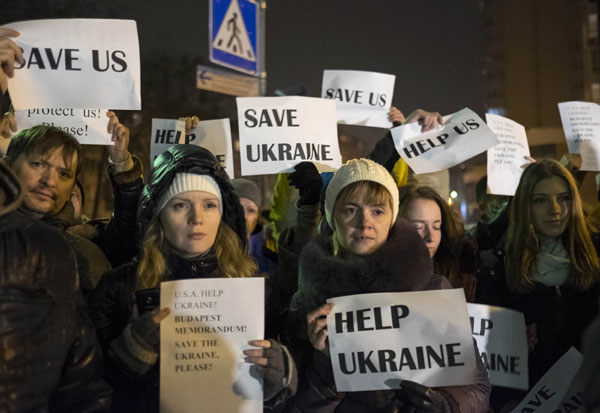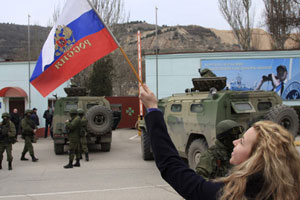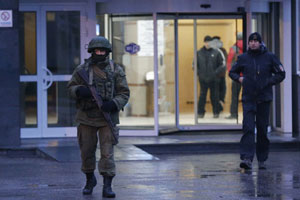 |
|
Ukrainians rally against Russia in front of the US embassy in Kiev on Saturday. [Photo/Agencies] |
Ukraine put its armed forces on the highest alert on Sunday after Russian President Vladimir Putin declared he had the right to use military force to protect Russian citizens in the country, creating the biggest confrontation between Moscow and the West since the Cold War.
"This is not a threat, this is actually the declaration of war to my country," said Ukraine's Prime Minister Arseny Yatsenyuk, head of a pro-Western government that took power when Russian ally Viktor Yanukovych fled last week.
Putin obtained permission from Russia's parliament on Saturday to send troops into Ukraine, spurning Western pleas not to intervene.
NATO's top official said Russia's military intervention in Ukraine violates the UN charter and threatens peace and security in Europe.
NATO Secretary General Anders Fogh Rasmussen spoke on Sunday before going into a meeting of the North Atlantic Council, the alliance's political decision-making body.
"Russia must stop its military activities and threats," he said.
He said he called the meeting "because of Russia's military action in Ukraine and because of President Putin's threats against this sovereign nation."
In a bloodless maneuver, Russian forces have already seized Crimea - an isolated Black Sea peninsula where Moscow has a naval base. They surrounded several small Ukrainian military outposts there on Sunday and demanded that the Ukrainian troops disarm. Some refused, but no shots were fired.
The outnumbered Ukrainians placed a tank at the gate of a Ukrainian military base in Crimea, leaving the two sides in a tense standoff.
Ukraine's security council ordered the general staff to immediately put all armed forces on highest alert, the council's secretary Andriy Parubiy announced.
The Defense Ministry was ordered to call up reserves - theoretically all men up to 40 in a country with universal male conscription.
"If President Putin wants to be the president who started the war between two neighboring and friendly countries, between Ukraine and Russia, he has reached this target within a few inches. We are on the brink of disaster," Yatseniuk said in televised remarks in English, appealing for Western support.
Putin's declaration that he has the right to invade his neighbor - for which he quickly received the unanimous approval of his senate - brought the prospect of war to a country of 46 million people on the edge of central Europe.
From Washington, US President Barack Obama spoke with Putin by telephone for 90 minutes. The White House later said, "President Obama expressed his deep concern over Russia's clear violation of Ukrainian sovereignty and territorial integrity, which is a breach of international law".
Putin told Obama, "There are real threats to the life and health of Russian citizens and compatriots on Ukrainian territory".
Moscow reserved the right to intervene on behalf of Russian speakers anywhere they were threatened, Putin added, according to the Kremlin's transcript of the phone call.
So far, the Western response has been largely symbolic. Obama and other leaders suspended plans to attend a G8 summit in Sochi. Some countries recalled ambassadors.
"This is probably the most dangerous situation in Europe since the Soviet invasion of Czechoslovakia in 1968," said a Western official. "Realistically, we have to assume the Crimea is in Russian hands. The challenge now is to deter Russia from taking over the Russian-speaking east of Ukraine."
In Russia, state media portray former Ukraine leader Viktor Yanukovych's removal as a coup by dangerous extremists funded by the West and there has been little sign of dissent with that line.
Russian officials have repeatedly described Ukraine's Russian speakers - some of whom have Russian passports - as facing urgent danger. Itar-Tass quoted Russian border guards as saying 675,000 people had fled Ukraine for Russia in the past two months and there were signs of a "humanitarian catastrophe".
 |
 |
|
|
|
|
|
|
|
|
